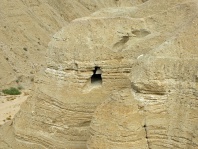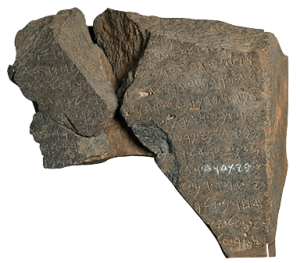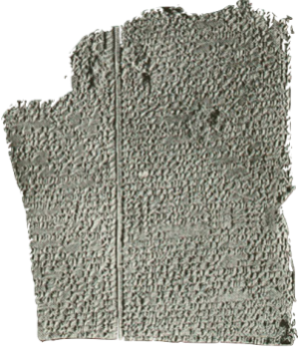Take for example the genealogies found at Genesis 4:17-5:31; 10:1-31; 11:10-32; 14:1-8; 21:32; 22:20-24; 25:1-4 & 12-19; 26:34; 28:6-19; 36:1-4 & 9-43; 38:1-5; 46:8-27; 48:7; Numbers 1:1-42; 2:5-32; 26:12-60 and 27:1, just to start with. The details in these accounts prove the Bible to be a compilation of amazingly accurate historical details.
Also, read the genealogies that start in First Chronicles, and you'll find many names of ancient people who went on to found cities and countries that we're still familiar with today. Look at the long lists of names of people, then see who their fathers were and who they descended from, the things they did, etc. – things that nobody would be interested in today – and ask why anyone would make all of this up. How could anyone fake so much detail? Also realize that each of the names actually meant something in Hebrew, so they weren't just a jumble of sounds.
Consider the fact that few would question the authenticity of the Tomb of King David (although the current location is questionable), since it is so well documented by known accurate historians, such as Josephus. Notice that the Gospel writer Luke wrote in the book of Acts (in Chapter 2, verse 29): 'It's good to speak to you openly about the patriarch David; for he died, was buried, and his tomb is still with us to this day.' Yet, many modern critics claim that David never existed! Why would anyone say such a thing when there is no proof at all that he is fictional?
And look at the meticulous records of the people who served in the court of King David, as can be found from 1 Chronicles 23 to the end of that book. Who they were, where they were from, to whom they were related, and what their positions were, is all listed in great detail.
Consider the well-documented historical accounts of what happened when the king of Assyria attacked Judah during the time of King Hezekiah, then compare that to the Bible's historical details as found in account at Second Chronicles 32.
Also, notice how well 2 Kings 23:29 narrates the history of when the Egyptian Pharaoh Necho II fought against both the Assyrian army and the Judean King JosiAh (and won), and you'll realize that this is accurately-recorded history!
As for Moses and the Exodus; consider the detailed record of the travels of Israel from their place of departure from Egypt until they entered the Promised Land, as found at Numbers Chapter 33. Here you'll see that it describes every little town that they traveled past, the directions they went, how long they stayed in each place, and even the geography of the land!
Then look at the writings of Luke (Gospel of Luke and the book of Acts) and pay attention to the names, the cities, the titles, and even a specific home … such detailed and proven documentation is virtually unparalleled in any other ancient writing!
For a fact, the Bible is a vast wealth and storehouse of the history of ancient peoples, which through ignorance and prejudice goes unexplored by many. Consider for example, the records of the peoples and the trade goods they supplied to the Mediterranean trade port of Tyre in the Seventh Century BCE, as found in the Twenty-seventh Chapter of the Bible book of Ezekiel. Where else can such valuable records be found?
Recent Archeological Discoveries
Yet, with no evidence to back their claims, Bible critics say that the 'Old Testament' was all written in the Sixth Century BCE, and that the 'New Testament' and its accounts about Jesus were written almost three-hundred years after he walked the earth. And though archeologists have proven such claims (which originated in the mid-1800s) false, college professors continue to teach such things to their philosophy classes, and gullible students continue to believe the historically-wrong information. Notice for example, that the oldest Bible text archeologists have discovered (of the Pentateuch) appears to date to the Seventh Century BCE… which is before the destruction of Jerusalem by Babylon, and which dates to the time of the Solomon's Temple. But despite the evidence provided by archeological finds, Bible critics have taught and are still teaching that there was no such temple in Jerusalem. WHY?
Also, many have claimed that there was no King David, and that Jerusalem was just a backwater town during the time attributed to his reign. However, recent archeological discoveries at Tel Dan (northern Palestine)
have uncovered a stele
from the Ninth Century BCE that mentions the family line of David… and they are currently excavating a major structure that they think may actually prove to be David's palace.
Some have even gone so far as to claim that there was no ancient nation of Israel; yet a granite stele commemorating the victories of Pharaoh Merneptah, who is said to have reigned from 1212 to 1202 BCE (currently on display at the Cairo Museum) brags of a conquest of the nation of Israel along with the nearby Philistine cities of AshKelon, Gezer, and YanoAm. Yet, although claims that there was no nation of IsraEl have again been proven false by the findings of archeology, you still don't read about such amazing finds in modern college textbooks!
It is a fact that the Philistines whom we read about in the Bible really existed, for this has been documented by modern archeological discoveries of such major cities as AshKelon. And note that the land is still called Palestine today, which is just a Greek corruption of the name Philistine.
And the nations that came though Lot's daughters (the Moabites and the Ammonites) have also been documented by archeologists through Egyptian and Assyrian inscriptions. If you're unfamiliar with the story, the Bible tells us that Lot fathered sons by each of his two daughters after the destruction of Sodom and GomorRah. The son by the eldest daughter was named 'Moab,' or, 'Of My Father' (see Genesis 19:37), and the son of the younger was named 'AmMon,' or, 'Son off My Family' (see Genesis 19:38). So even the names of these people testify to the Bible's description of their coming from an incestuous relationship.
Hebrew historians and most religious commentators usually agree that Moses wrote the first five books of the Bible (known as the Pentateuch). However, that isn't totally accurate; for the words of Genesis (such as, 'This was the scroll of…' and 'This was the generation of…') show that almost all of the first six Chapters were compiled from previously written records or transcribed from ancient songs.
Where could such records (if Moses in fact had them in written form) have come from? We simply don't know, because the Bible doesn't tell us. However, Moses could have collected them from Egyptian libraries during his life as 'the son of the daughter of Pharaoh.' However, it appears as though some of the information may also have been passed along as songs through the Hebrew family line. Why do we say that?
Understand that ancient history and news was once transmitted in song because that was the only means of mass communication at the time. If you will closely examine the first Five Chapters of Genesis, you will notice that there is definitely a cadence and symmetry. For example, look at the starting words in each of the paragraphs or verses at Genesis 1:6, 11, 14, 20, 24, and 26.
It is interesting that archaeologists, while digging in MesoPotamia,
have actually found a song or a poem that was recorded on ancient clay tablets that discuss some of the same events that are covered in Genesis chapters six through eleven, which is now known as the Epic of Gilgamesh. And because there are similarities between both accounts, Bible critics were quick to proclaim that this is where Moses got his information about Noah and the flood. However, if you examine the words that are found in that text, you'll see that the Epic of Gilgamesh reads more like a fairy tale and is nothing like the factual type of account that is found in Genesis. So all this discovery really does is confirm that other people recorded the same things as happening.
Did Moses In Fact Write the Pentateuch?
Yes, Moses did write parts of the first five books of the Bible, because the accounts say so (see Numbers 33:1, 2), and Hebrew historians have always claimed that he did. Yet the fact that in most cases where his name is mentioned it is shown in the third person may also indicate that this isn't totally true. For if Moses wrote the words found at Numbers 12:3, 'Now, Moses was the humblest man on the earth;' then what he said was an oxymoron (a saying that disproves itself). So we have concluded that although Moses was likely responsible for the words that were said (and possibly for the compilation of the words of Genesis), the things that he said and did may have initially been written by a secretary or scribe… possibly Moses' close assistant Joshua. For notice what was written at Joshua 24:26: 'Then he (Joshua) wrote those words in The Scroll of the Laws of God.'
However, notice that even Joshua's name is occasionally written in the third person in those accounts. And although speaking of one's self in the third person isn't an unusual style for Bible writers (we find Matthew, Mark, and John doing that in their accounts), their names aren't usually mentioned in the third person, as were the names Moses and JoShua. Nor is it unusual for Bible writers to use secretaries, because that's what Paul obviously did because of his poor vision. So the fact that Moses' and JoShua's names were used so frequently and in so many places (sometimes up to three times per sentence in the ancient text) indicates that someone else likely did the compiling and writing.
The book of Deuteronomy is a good example of what we're talking about here. A close examination of the texts shows that the book was actually a compilation of written speeches that were delivered on the day that the IsraElites were to enter the Promised Land (see Deuteronomy 1:1). So Moses likely did write most of the speeches, which clarified how the Law would apply once they had entered the Promised Land, but these speeches were later collected and compiled into the book of Deuteronomy by someone else after his death. This has to be true, because Moses' death is also mentioned in Deuteronomy. Therefore, though Moses wrote the Laws and the speeches, he likely wasn't the one who recorded the details.
Thereafter, you might then notice that the Bible book of Joshua picks up its narrative immediately after things described in the book of Deuteronomy, as does the book of Judges after Joshua, and as does the book of Ruth after Judges (just read the ending of each book and the start of the next book, and you'll see why we're saying this). So it clearly looks like all the Bible books from Genesis to Ruth were originally compiled and written together by the same person, who must have lived sometime during or after the time of King David (because he is mentioned at the end of Ruth), and the likely source could have been SamuEl or even the much later scribe Ezra. Yet, all of the above works had to have been originally written during or shortly after the events being described, and then they were compiled into a single narrative at a later date. Then it was possibly as late as the Third Century BCE (when the Septuagint was created) that this single writing was separated into books, which were each given the names we are so familiar with today.
Bible History or Secular History?
When Bible history and descriptions clash with secular history and descriptions, most assume that the Bible is wrong… once again. But is that really the case? Take for example, the Bible's description of Darius, the king of the Medes. He was mentioned at Ezra 4:5 as being a contemporary of the Persian King Cyrus. However, secular historians tell us that there was no such king of the Medes. They say that Darius was in fact a Persian king whose reign (522-BCE to 486-BCE) followed that of Cyrus. Which view is correct?
Notice that the same account in Ezra (see Ezra 4:24) agrees that there was also a Persian king named Darius, who reigned after Cyrus. However, it says that his reign came after that of Xerxes and his son ArtaXerxes. So, modern historians and archeologists, in their desire to discredit the Bible, have simply confused Darius of Media with his much later Persian relative. We trust the account in Ezra, because no one questions the existence of Ezra or the period in which he lived, since he is the one that is credited with compiling most of the Sacred Scriptures of Israel (OT) that we have today.
As for Darius, the king of the Medes; not only does the Jewish historian Josephus claim that there truly was a Darius, king of Media, but he tells us that that Darius was an uncle of King Cyrus on his mother's side. And the fact that Darius was a Mede and that he also ruled the land of the Chaldeans is once again confirmed by two other Bible writers, Daniel (see Daniel 9:1) and Zechariah (see Zechariah 1:1). That this is not Darius the king of Persia who historians say succeeded Cyrus is confirmed at Zechariah 7:1-6, where it shows that God's Temple had not yet been rebuilt. Also, the Persian king was said to have lived sixty-three years, while the Bible shows that the Median king lived at least sixty-six years.
So we have three contemporaries of Darius the king of Media who tell us that there was such a man.
The Language Changes
Since the Hebrew portion of the Bible was written over a period of almost sixteen-hundred years, we would expect to see natural changes in its language over such an expended period. Is this what we find? Yes! Although the first portions of Genesis are written in the Hebrew language of Moses' time (they were probably translated by Moses or Joshua); the portion that tells of the life of Abraham is written in an ancient dialect called Ugarit, which reflects Hebrew as it was spoken before the Israelite's four hundred years of living in the land of Egypt.
After that, the language continues to change until the time of Daniel, who wrote in a language that is similar to Hebrew, Aramaic (in the mid-500s BCE), because of the influence of the Jew's captivity in Babylon and their subjection to the Persians.
The next major Bible language change came during the time of Jesus. Although Matthew, Paul, John, Peter, James, and Jude may have originally penned their books in Aramaic or Hebrew, Mark and Luke likely wrote in the common language of their day, Koine (pronounced ko-ee-nay) Greek. And sometime after their writing (possibly as late as the Second Century in the case of Matthew's Gospel), the other NT books were also translated into that language.
So as you can see, charges that the Bible was written much later than its writers indicated are ludicrous. The changes in the languages prove that this isn't true.
The Gospels
One of the most notable stamps of authenticity in the Christian Era Scriptures is Matthew's mention of Jesus preaching in a town called 'Caesarea Philippi' (at Matthew 16:13).
While some critics have claimed the Bible's Gospel accounts weren't written for more than a century after Jesus' death, internal proofs such as Matthew's use of that city name shows that this book had to be written prior to the middle of the First Century. For the name Caesarea Philippi was only used during the brief reign of the Herods. Both before and thereafter, it was known as 'Paneas,' after the Roman God Pan, whose idol was located there. Since this fact would have been lost to history within just a few years, it proves that the Book of Matthew had to be written shortly after Jesus' execution.
And notice the methods for accurately dating events from the history of people that Bible tells us were ruling at the time of Jesus' birth, which are found at Luke 3:1, 2. Luke knew exactly who these people were and when they ruled, as documented in history! Ask yourself: How could a writer have known all these accurate details a couple of hundred years later? And if such a person were to do the research just to create a forgery, for whose benefit would he do this?
In addition; copies of the writings of the early Second Century Christian Elder Papias have been found, and in these he speaks of the Gospels and writings of Matthew, Luke, and John. So regardless of the unfounded claims of modern critics, there is little question that the Gospels were all written toward the middle and late portions of the First Century.
The Names
Another irrefutable proof of the Bible's authenticity as a historical record can be found in the names of people and places that have never changed … and the Bible even gives the reasons why those names were chosen. Notice for example, the account found at Genesis 10:8-12, which says, 'Kush fathered Nimrod, who became a giant on the earth. He was a gigantic hunter before Jehovah God. That's why people speak of Nimrod as the gigantic hunter before Jehovah. His kingdom started with Babylon, then Orech, Archad, and ChalanNe, which were all in the land of Shinar. Then outside that land, [he went to] Assyria and built Nineveh, the cities of RehobOth, Chalach, and Dase (between Nineveh and Chalach), which is the great city.'
You can see that the names of well-known cities (not mythical) can be found there. And how did Babylon (a Hebrew word for confusion) get its name? The account at Genesis 11:8, 9 tells us: 'And [Jehovah] scattered from there over the entire face of the earth, so they stopped building the city and its tower. That is why [the city] is named Confusion (Babylon); because, that's where [Jehovah] confused all the languages of the earth and scattered them from there over all the face of the earth.'
Why, the fact that there are so many unrelated languages among mankind today could only be explained by the events of this Bible account, since linguists admit that languages come from different roots. And what's more, the Bible's description found at Genesis 11:3, that the people built the city out of bricks, and at 11:4, where it tells of their building a sky-scraping tower, can still be seen in the ruins of that ancient city in Western Iraq. And even the name of the founder of one of these cities (Nimrod) can still be found in the ancient city in Assyria that was named for him, Nimrud (a spelling variation due to language differences).
Also, Nimrod's father Kush is still recognized as the progenitor of the people of Ethiopia; for his name is commonly used by archeologists and Egyptologists alike when speaking of the people of that land. It's only in places like North America and Europe (where the Bible is under attack) that anyone questions these names that have been written and accepted as history for millennia!
And while those are outstanding examples, the Bible is literally filled with the mention of people and places that have only recently been found and documented by modern archeology. A good example of this is the nation known as the Hittites. During almost the entire Nineteenth Century, archeologists claimed that there was no such race; but now they and their cities have been found in abundance! These people appear to be the ancestors of the modern-day Armenians, who (by the way) have always claimed a grandson of Noah as their progenitor.
And
getting back to the time of Jesus, note that a stone commemorating Jesus' judge, the Roman Governor Pontius Pilate (who was also once considered mythical), has been located and deciphered.
So while those who hate the Bible claim that it is just a collection of myths and fairytales, the records and ruins of places and events that we read about therein are constantly being found, proving that the Bible is in fact the most amazing and accurate record of the history of the world!





